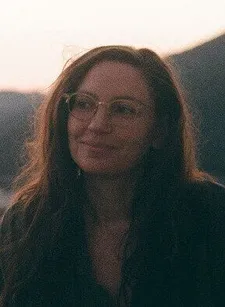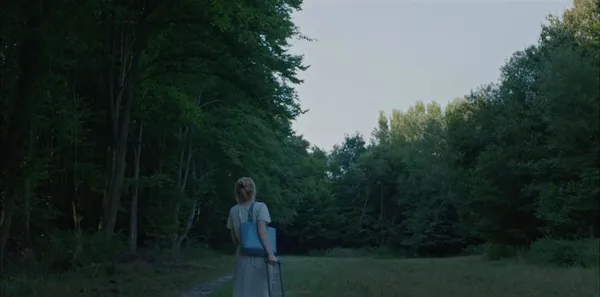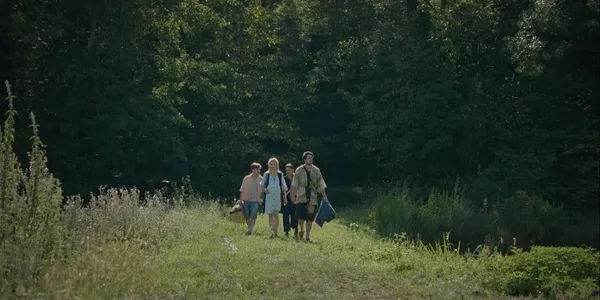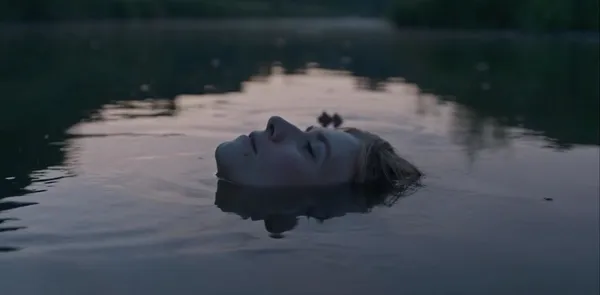Tomorrow I Die sees debut director Nikol Cybulya weave elements of psychological thriller, folk horror and a spot of comedy together to tell the tale of a pregnant woman who finds herself undergoing a crisis while on a country retreat. Irma (Niké Kurta) has just returned to the cottage where, we will learn, her mother committed suicide years before. She also feels under existential threat, asking an old friend Stefi (Emöke Piti) and her half-brother Marci (Márton Kerekes) to join her in a bid to shake off her feelings of existential dread. The Hungarian film had its premiere at Warsaw Film Festival, where it received a special mention from the main competition jury. We caught up with the director to talk about its themes and some of the challenges of making it.
How did you find the countryside setting for the film, which is very atmospheric?
Nikol Cybulya: We did everything in a hurry because we didn't really have that much time and especially in the summer, it's kind of hard because everybody is shooting in the summer and we didn't have a location manager. So it was my production manager and me checking out Airbnbs. We found two locations but we pretended it was one. We found a private forest in the middle of the country, which was quite far from the capital, because we are all from Budapest. So we had to travel there and we stayed there for one week. It was the kind of private woods where people go to hunt and there is it's very cute little house but it wasn't a good house for location. They even had two lakes, which was really good because one lake was really artificial, so we shot the night scenes there because it was very shallow. Then we found another lake outside of the private area that was more natural and we shot the daytime scenes there.
The house we found through either Airbnb or Booking.com. We were looking for a wooden house. I wanted something that's not too easy to place, so neither eastern European or western European. The inside of the house was already kind of in the style that I imagined, which means half of the furniture was grandmother style and the other half is Ikea.
You’ve said it’s a personal story…
 |
| Nikol Cybulya: 'I always want to use humour because I think that's It's the hardest thing to write' Photo: Courtesy of Warsaw Film Festival |
NC: I also lost my mother when I was young but of course not in that horrible way and I wasn't that young - that was just because of the horror element. But I think the most personal aspect of it is if we don't deal with our traumas for years, then our relationships won't work. That is my exact experience that so many of my relationships with guys and also friendships didn’t work and then when I really started working on myself and going to therapy, it was really hard and lonely work but it really had the result that some of my relationships got better. So I really wanted to write this message that it's really worth it to work on ourselves because it can solve maybe just a tiny bit of our problems.
There’s a real sense of style. Was it a challenge to create the specific colour palette and atmosphere?
NC: Well, first of all, there are so many good films set in the forest and by the lake, especially horror films. I wanted to use this cliche but it also works because when you go outside and you have the forest and the lake and you catch the magic hour it means you already have a nice shot. But we were talking a lot about this with my cinematographer Dániel Kiszler. Like what kind of greens we want and what kind of blue the sky should be. Of course, we ended up with references of films that were all shot on film, either 60mm or 35mm. I don't consider myself to be a film snob and that everything should be shot on film but somehow every film I watched and I thought, “Oh, these forests look nice” turned out to be shot on film. We didn't have that but we had a very good colourist. Together we were trying to find this kind of filmic blue but not too filmic because we also wanted to make a distinction between the reality and and the unreality, and even a bigger distinction with the short flashbacks with the little girl that we wanted to be very different from everything else. But basically our approach was to make it a bit cold. Blueish.
This film also seems to be catching a wave of more feminist horror - pregnancy seems to be cropping up a lot in them lately too. What do you think about that?
NC: It's weird because when I first started writing this story, she wasn't pregnant. The other very weird parallel is that my last short film before this is a short film about Maria Theresa, the famous. Austro Hungarian monarch and it's about her giving birth in public, so there is a birth scene in that. So that probably has something to do with my interest in birth. But also I think it's such a life-changing event and it's something that can really draw attention to our trauma which we don’t want to deal with.
There's quite a bit of humour in this film. You come from a kind of TV comedy drama background to a degree and I wondered if that was maybe an influence on you wanting to include these more humorous elements.
NC: Well, no, my TV background is just the kind of work that you do to earn money. But I think just in general humour is extremely important to me in life. I also think that humour and fear and horror are so intertwined because like the most painful events in life we can only deal with with humour. Every time I start writing something, I never want them to be full-blown comedies, but I always want to use humour because I think that's It's the hardest thing to write and so is the biggest challenge for a writer or director. But it’s also the highest pay off, especially when you watch the film with an audience and those are the only scenes when you can actually hear if they like the film.
In some ways the thing that holds the most horror in your film is the relationships.
NC: That was my concept actually. If somebody had said, it's not a real horror, my answer would always be that the real horror is how they treat each other, the relationships.
I think probably a lot of people can relate to those kinds of slightly toxic relationships that somehow stay with us. The half-brother is very interesting, was he a fun character to create because you had a choice there, it could have been a sister but you opted for this dysfunctional half-brother.
NC: In earlier versions they were always brother and sister but, at first, it was not half but ful brother and sister but then I realised that then the story would be about them both. So my personal experience is only about a woman's experience, and, of course, the subconscious is always there because I also have a half-brother. Although we have a very good relationship. That’s probably the base but then I went very far from it, imagining if our relationship had turned into a bad one.
 |
| Niké Kurta in Tomorrow I Die. Nikol Cybulya: 'I was really lucky with her and she was also kind of like an artistic partner for me and very, very supportive' Photo: Courtesy of Warsaw Film Festival |
There’s a complexity to the women’s relationship, you can feel the weight of the years in it.
NC: Yes. I think friendships are just so hard and complex and, you know, it's never really clear where a friendship starts and ends. It's so easy with relationships and breakups and even families - family ties, we know what they are. But friendships, you just never know what you can expect from a friend. So, for me, it’s a more interesting story.
I wanted to talk about the casting as well because obviously the central character is extremely important, particularly because of having to act as though pregnant as well, which brings another layer to it.
NC: I already knew the main actress Niké Kurta was going to be in the film because are so many talented actors in Hungary, but also it's kind of hard to choose the right one for the screen because traditionally we are a country where there are more theatre actors, and it is only in recent years that we have more films so they can kind of practice. I needed someone whose face is already ready for the screen. Of course she's good on this stage too but I just knew that she had all the qualities already because I knew her before and that made it very easy to write the dialogue for her because I knew how she would say it.
As for acting pregnant, she doesn't have a kid and I don't have a kid so none of us knew personally how to do this. But the other thing is that Hungary doesn't really have a lot of horror films so far - I think we can maybe count it on one hand. I think acting in a horror kind of way is also extremely hard and I think we don't really appreciate Hollywood films with those actors. They never get the recognition but I think it's really hard to be scared, crazy and shout and cry and everything. So I was really lucky with her and she was also kind of like an artistic partner for me and very, very supportive.
 |
| Nikol Cybulya: 'I think the most personal aspect of it is if we don't deal with our traumas for years, then our relationships won't work' Photo: Courtesy of Warsaw Film Festival |
Hungarian independent cinema is is having a bit of a wave at the moment. There seem to be quite a few films coming through. Are you finding that that's helpful for you to get things made?
NC: I was just thinking of that and how crazy it is that I think this year, or maybe next year, there will be more Independent, micro budget films here than ‘normal’ ones. But I think we all do our films very differently. So I was also thinking before the film to ask advice but it’s unique, how people got the money so I think we all just have to find our own way like again and again. It’s sad on the one hand that there are so many directors who had to make their first feature on a low budget, but it’s also kind of nice and crazy that there are so many of us who go through this very crazy and stressful process to make a film. It's cool that there are so many very determined directors.
This is your first feature and is there anything that you think next time I'm definitely going to do this or not going to do that?
NC: I think almost everything I would do differently. For me the biggest hardship was to shoot this film in 13 days, which is really nothing. So I would definitely have more time but you know time is money so that’s that. The main thing was that I wrote this screenplay alone and it's not because I wanted to, it's just I really didn't know if it was going to turn into a film or not so I couldn't ask anybody to write with me just for the sake of it. And it was a really stressful experience to write alone. So I would never write alone again.






















